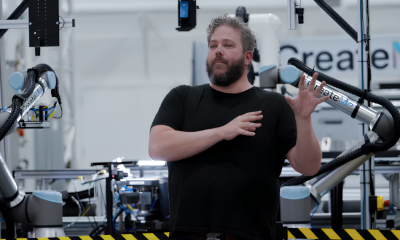Interviews
Jay Madheswaran, Founder & CEO of Eve – Interview Series

Jay is the Founder & CEO of Eve. He has over 15 years of experience in AI and Machine Learning.
Prior to Eve, Jay was an early stage investor at Lightspeed Venture Partners. Before that, he was the First Engineer and Head of Product Engineering at Rubrik, helping build the company from the ground up.
Eve is the first personalized legal AI tool built for the legal profession that you can partner with, train, and teach, just like any other member of your team.
What initially attracted you to engineering and computer science?
When I was heading to college, I originally planned to become a chemist/material scientist. But I quickly found the pace of progress with computer science was several orders of magnitude quicker than anything else on offer. This felt like a momentous occasion, a time in history where we had the opportunity to use our brain power to improve virtually everything we do. I was hooked.
But taking a step back, I have been a “builder” since I was a young kid. ’ I used to spend a lot of time building things out of toys and other small odds and ends. My crowning achievement: a toy elevator made out of a bear-shaped jello container that would ferry broken toys up and down on important toy business).
My passion for building things never went away, I just graduated from broken toys to artificial intelligence and am always looking forward—what can we build next?
You were First Engineer & Head of Product Engineering at Rubrik for over 4 years, what were you working on and what did you learn from this experience?
Over my time there, I had the tremendous opportunity to grow with the people around me. From a technical perspective, I worked on everything from a fully distributed job scheduling framework to the front end code, and later progressed into management.
The most valuable experience that I got while working at Rubrik was the experience of building a truly transformational product, with many lived and learned examples of what it takes to do so.
After this you became an early stage investor with Lightspeed Venture Partners, what type of AI companies were on your radar and what qualities did you look for in a team when investing in startups?
I was an Enterprise AI investor, primarily looking for companies enabling others to build with AI. I primarily looked for clarity of thought on the key pain point they were solving, and why they thought their framing of the problem was the right one. Beyond that, my top must-have was the ability of the founders to execute the solution.
What made you realize that you wanted to return to your engineering roots, and launch a legal startup?
I’ve always been passionate about building. Even during my time as a venture capitalist, I would create sample apps to validate my ideas. This hands-on approach was particularly enlightening when exploring AI companies. A question began to captivate me: how can we create a world where AI empowers people? This growing fascination led to the inception of Eve. I chose the legal field as our starting point, not just for its complexity but because it presented clear, day-to-day challenges that AI could address. The most thrilling aspect for us is the transformative potential of AI and software in redefining workflows. We’re not just talking about incremental improvements; we’re envisioning a complete overhaul of how law firms operate. This is a groundbreaking shift, and it’s what excites us the most.
What type of legal research and legal assistance is Eve capable of?
Eve is capable of performing legal research—looking through a repository of court rulings updated daily, identifying key case law. Eve uses natural language search to perform legal research, and can incorporate key case details into the search. Eve is also capable of helping brainstorm and evaluate key legal claims and procedures throughout the lifecycle of a case.
How is the data sourced to train the AI models?
Eve uses the most advanced Generative AI models to power responses, including GPT-4, Anthropic’s Claude 2 and internal proprietary AI models. Eve’s foundation models were trained on publicly available information on the internet, as well as large legal datasets provided by Eve’s partners. Eve leverages a state-of-the-art LLM Ops framework to ensure that our models are constantly evaluated for accuracy and up-to-date-ness. As new cutting edge models (such as GTP-4 Turbo and Claude 2.1) are released, we work through a diligent evaluation, analyzing them for quality and then add them to our framework.
Laws and regulations change rapidly, how does the AI keep current with the latest news and developments?
The most important part of the model that needs to be updated with new laws, statutes, and court rulings is the Legal Research functions. Our Legal Research feature is built with a RAG approach —and this product sources information differently than the rest of the model—partnering with an open-source court case reporting provider that updates its database on a daily basis. This allows us to have legal information that is up-to-date, surfacing key rulings and decisions for legal professionals.
Hallucinations is one of the core issues with LLMs, what is happening on the backend to mitigate or reduce these potential issues?
We are using multiple approaches to help prevent hallucination. The main risk that we see for legal is an AI hallucinating and making up a legal case, presenting it as a cite-able resource. We’ve taken extra care to create a legal research functionality for Eve that employs the retrieval-augmenter-generation (RAG) method for searching for relevant case law. When performing Legal Research, Eve is looking into a closed box of court rulings—unable to make up a case that isn’t in our database. Outside of legal research we are working diligently to refine our models. We also put concerted effort into enabling our users with pre-built and curated “skills” that they can use, which are prompt-engineered to give optimal results. Our qualified success team does white-glove onboarding and support, helping to educate users on how to use generative AI in the safest way possible.
What is your vision for the future of AI in the legal profession?
AI is starting to disrupt the legal landscape, and we think it is only beginning its journey. The advances in AI enable knowledge workers such as legal professionals to achieve superhuman capabilities. Our mission is to empower legal professionals to harness the power of this new technology and augment their own abilities. We envision a world where AI is an integral part of all case work. Our goal is to build a product that not only helps increase lawyers’ efficiency, but starts to work alongside legal professionals, thinking and reasoning alongside them—helping with more and more valuable and strategic parts of their workflows.
Thank you for the great interview, readers who wish to learn more should visit Eve.












